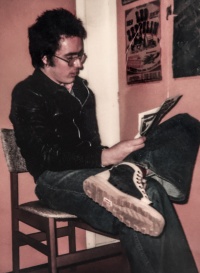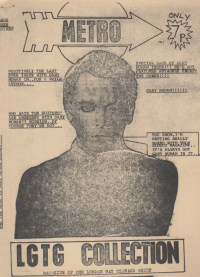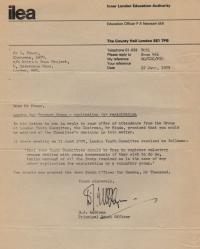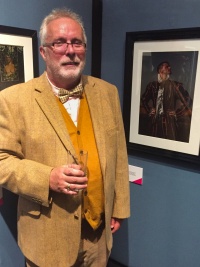Difference between revisions of "London Gay Teenage Group"
(Chris Heaume who helped support the group and who was involved from the start provided this detail during a conversation 8 May 2018.) |
m (spelling correction Somerville) |
||
| Line 1: | Line 1: | ||
| − | [[File:Screen Shot 2017-03-26 at 16.36.12.png|200px|thumb|The first 6 monthy report on LGTG produced in 1976/77]] The '''London Gay Teenage Group''' was founded in autumn 1976 by [[Robert Hall]] and two other young gay teenagers; it was later developed by a collective of people including Robert Hall and [[Steven Power]].Initially the group met at the Oval House Theatre and then the premises of Grapevine in Holloway Road, London. It was run totally by and for the under-21s (who would all at that time have been under the [[age of consent]]). In 1979 the group moved to premises in Manor Gardens, London N7. Youth worker Chris Heaume provided support for the group.Among the well known figures who attended the group before they found fame were [[ Jimmy | + | [[File:Screen Shot 2017-03-26 at 16.36.12.png|200px|thumb|The first 6 monthy report on LGTG produced in 1976/77]] The '''London Gay Teenage Group''' was founded in autumn 1976 by [[Robert Hall]] and two other young gay teenagers; it was later developed by a collective of people including Robert Hall and [[Steven Power]].Initially the group met at the Oval House Theatre and then the premises of Grapevine in Holloway Road, London. It was run totally by and for the under-21s (who would all at that time have been under the [[age of consent]]). In 1979 the group moved to premises in Manor Gardens, London N7. Youth worker Chris Heaume provided support for the group.Among the well known figures who attended the group before they found fame were [[ Jimmy Somerville]] and [[Matthew Bourne]].<ref>http://www.bangagong.co.uk/bangagong.co.uk/Phil_Cox_-_A_Tribute.html Tribute to Phil Cox</ref> |
In 1984 the group published ''Something to tell you'', a report summarising the findings of a survey of young LGB people.<ref>Trenchard, Lorraine & Warren, Hugh, 1984, ''Something to Tell You, The Experiences and Needs of Young Lesbians and Young Gay Men in London'': London Gay Teenage Group.</ref> | In 1984 the group published ''Something to tell you'', a report summarising the findings of a survey of young LGB people.<ref>Trenchard, Lorraine & Warren, Hugh, 1984, ''Something to Tell You, The Experiences and Needs of Young Lesbians and Young Gay Men in London'': London Gay Teenage Group.</ref> | ||
Revision as of 18:12, 8 July 2018
The London Gay Teenage Group was founded in autumn 1976 by Robert Hall and two other young gay teenagers; it was later developed by a collective of people including Robert Hall and Steven Power.Initially the group met at the Oval House Theatre and then the premises of Grapevine in Holloway Road, London. It was run totally by and for the under-21s (who would all at that time have been under the age of consent). In 1979 the group moved to premises in Manor Gardens, London N7. Youth worker Chris Heaume provided support for the group.Among the well known figures who attended the group before they found fame were Jimmy Somerville and Matthew Bourne.[1]In 1984 the group published Something to tell you, a report summarising the findings of a survey of young LGB people.[2]
Believed to be the first LGBT group for young people in the world, it represented a significant turning point in LGBT history and was run by and for under-21s, initally ignored by the authorities. In the 1970s, it was unusual for young people to 'come out'.
Steven Power provides his personal story in his Vox Pop.
Vox Pop – A brief history of the London Gay Teenage Group
[Vox Pop entries are personal recollections by individual contributors.]
I was a working class lad from a Dagenham council estate whose needs were glossed over in sex education classes as a passing phase. Like many others, I was isolated and confused. Living with my parents, I worked as a trainee colour matcher. I’d been strong enough to come out to a former classmate who introduced me to my friend Simon Basler. Simon and I plucked up the courage to call the London Gay Switchboard from a phonebox at Chadwell Heath High Road, Dagenham. We got the Switchboard’s number from among the cards inside. I can remember the excitement and apprehension as I dialled. A man named Phillip Cox answered and offered some advice about London LGBT venues. But once he knew our ages, he gave us the opportunity to attend a meeting at LGTG’s new premises in Holloway Road. Despite my nerves, LGTG gave me the confidence to be openly gay. I am proud to have been at the start of a movement that led to many of the freedoms young LGBT people have today in the UK.
Philip Cox co-formed the LGTG with his housemate Paul at their council flat in Bath Street. Shortly after, Philip moved LGTG to Grapevine’s premises on Holloway Road, a sex education drop-in centre for young people. Philip left LGTG soon after as he was above 21, he was a great activist and encouraged me at 17 years of age to take the leading role.
I was elected first young chairperson of LGTG in winter of 1976 and came out to my parents and friends - but I was forced to leave home by my father. I harnessed my creative energy and moved to Finsbury Park, sharing a house with my partner Danny Baker. We lived with Gary Barker, a couple called Keith and Thomas Flannagan, and musician Jimmy Somerville. As members of LGTG, we faced alienation from adult LGBT organisations, who feared they would be arrested for supporting us. Only a few brave voluntary organisations put their weight behind us - namely Icebreakers, Grapevine and London Friend. We operated a drop-in facility on Sunday afternoons with music, coffee, discussions, a pen-pal service, and a telephone helpline. We offered a meet-and-greet service, as well as trips, and produced a members’ magazine and life-story publications - all on pocket-money contributions.
LGTG tackled prejudice against young LGBT people and we were hounded by police - who followed members and undertook surveillance of our premises. The group was eventually supported by a wider range of organisations as part of the Joint Council For Gay Teenagers. Famous politicians and musicians of the time paid visits, took part in benefits in our aid and talked to members. People such as Tom Robinson, Wayne County and Alan Freeman helped immensely. We set up our own music and video productions, supporting Jimmy Somerville and other musicians, and gave talks to other youth groups.
I was soon facing a right-wing backlash from the Festival of Light, overseen by the infamous Mary Whitehouse. I was up for ‘conspiracy to corrupt public morals’ (section 5(3) Criminal Law Act 1977). If prosecuted, I faced a maximum sentence of 10 years in prison. It was the time of the trial against Denis Lemon, editor of Gay News - accused of blasphemy by printing a poem suggesting Jesus might be gay. Mary Whitehouse brought about a successful prosecution. Lemon was fined £500 and sentenced to nine months’ imprisonment, suspended for 18 months and subsequently quashed by the Court of Appeal. I was next. But with significant support from a variety of donors, including some prominent MPs, we sought a Queen’s Council ruling which established the right of young people to meet regardless of their sexuality. A number of people supported me, including Micky Burbidge of Icebreakers, politicians, and others involved in the LGBT community. Without them I would have ended up in prison.
It took until June 1979 for LGTG became the first ever LGBT youth group to be recognised by the Inner London Education Authority. We were the only youth group to be asked to appear and state our case at ILEA London Youth Committee. Thanks to a lot of campaigning we obtained fully registered status and were able to bid for resource support. It was a major victory and changed the way the group was funded, but LGTG continued to be led by its members and not the workers.
We didn’t stop there. I went to the Houses of Parliament with Rose Robertson of Parents Enquiry to hold the first meeting with leading politicians, including Edward Heath, on the age of consent. It was a productive meeting and paved the way for the eventual equalisation of the age of consent. As LGTG expanded, we moved to Manor Gardens near Archway and developed a whole host of new initiatives, including widening our support to young women. I later did an interview about my life with Professor Jeffrey Weeks OBE for BBC’s Open University.[3]
LGTG ran for many decades. It expanded, took on youth workers and helped establish the International Gay Youth Movement. LGTG undertook major schools projects and produced publications supporting the development of LGBT youth groups around the world. Many of the members who passed through LGTG went on to lead more stable and supported lives and became part of a wider and developing community.
I really did burn out as a teenager. The pressure was immense - the possible court action from Whitehouse, the constant pressure from police observation, the task of supporting the thousands of young LGBT people who contacted the group, the publications, the trips, the helpline, the press enquiries. It was a massive undertaking and took its toll.
At 21, I decided to leave the spotlight. After LGTG, I ran The Essex Gay Youth Helpline from my flat in Barking, along with Simon Basler, Martin Collins, John Dunn and others. Martin was still at LGTG as well, so understood what they were doing. We then moved The Essex Gay Youth Helpline to a resource centre in Dagenham and set up an LGBT youth group in East London, where many isolated young people still needed support.
I eventually led a very successful career as a youth worker supporting thousands of young people across London boroughs. I am proud to have helped build some of London’s most iconic facilities, and helped unemployed youth when working for Capital Radio’s Jobmate Project. I am now retired with a tumour and gently undertake my passions. I have been a photographer all my life and have had works exhibited in a variety of London venues. I’m a co-founder of Gay Photographers Network (GPN), and exhibited at the London Guildhall Money and Power exhibition in 2017.
I believe it is important that my experiences should be available for others to see. The hard work and dedication of LGTG members and its supporters made a real change. I hope young people today can see that if I - a 17-year-old lad from a working class background - could help build something so vital, despite all the obstacles, they can make a difference too."
I am hoping that the archives will be made available through the National Archive collection in the future.[4]
References
- ↑ http://www.bangagong.co.uk/bangagong.co.uk/Phil_Cox_-_A_Tribute.html Tribute to Phil Cox
- ↑ Trenchard, Lorraine & Warren, Hugh, 1984, Something to Tell You, The Experiences and Needs of Young Lesbians and Young Gay Men in London: London Gay Teenage Group.
- ↑ Steven Power interviewed by Professor Weeks circa 1976
- ↑ Vox Pop item by Steven Power, 2017 – one of the leading young gay activists of the 1970's writes about the development of The London Gay Teenage Group in his late fifties.




